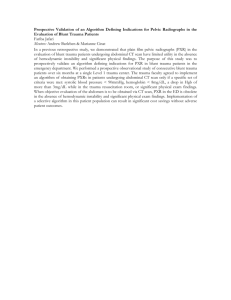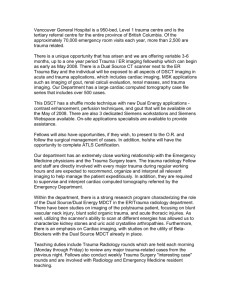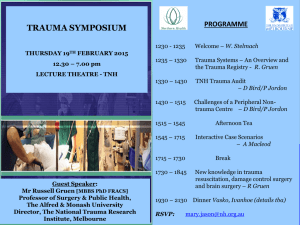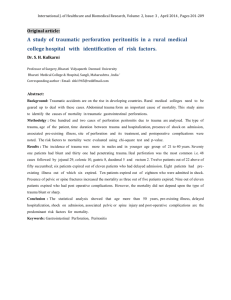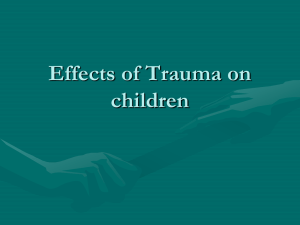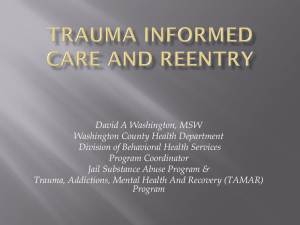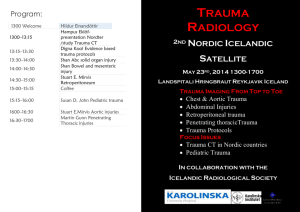Immediate whole body CT with Trauma in the ED
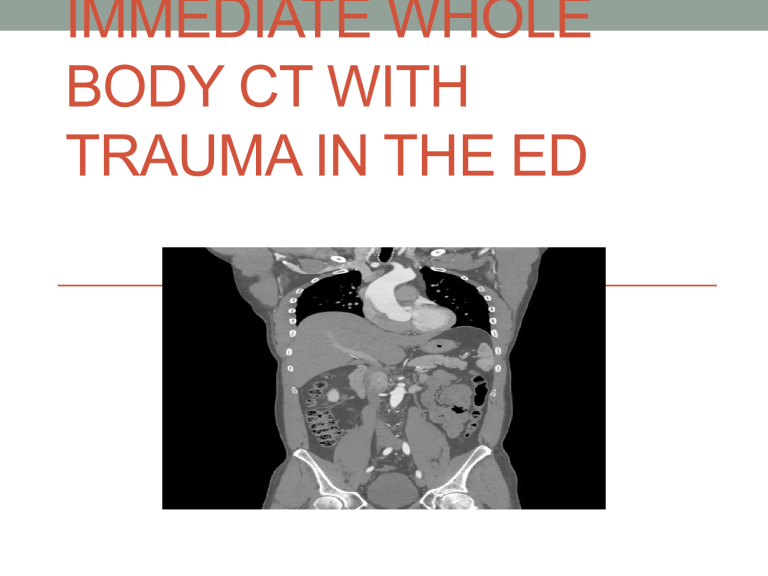
IMMEDIATE WHOLE
BODY CT WITH
TRAUMA IN THE ED
What and when to scan in Trauma
• Highly debated issue of our use of radiology in ED regarding trauma
• ?At what point should the scan occur
Royal College Radiology document 2011
‘Standards of practice and guidance for trauma radiology in severely injured patients’
Indications for a polytrauma protocol MDCT
• Haemodynamic instabilty
• Mechanism of injury or presentation suggests that there may be occult severe injuries that cannot be excluded by clinical examination or plain films
• FAST (if used) has demonstrated intra-abdominal fluid
• If plain films suggest significant injury, such as pneumothorax, pelvic fractures
• Obvious severe injury on clinical assessment
Difficulties in interpretation of the guideline
Clinicians vary in what they believe accounts for a mechanism that suggests ‘severe injuries that cannot be excluded by clinical examination on plain films’
For this reason units tend to develop their own guidelines for mechanism of injury requiring MDCT head to pelvis….
Mechanism of injury warranting head to pelvis scan at HEFT
Systematic Review Snapshot Sectiongoes someway towards
• Annals Emergency Medicine April 2014
• Lead author Dr, Kaushal – Mt Sinai School of Medicine
NewYork
• Entitled ‘Does Immediate Total-body CT reduce mortality and time in the ED for trauma patients
Aim of the paper
‘The advent of multi slice CT at the End of 90’s changed the approach to trauma patients in the ED setting, with some centers recently incorporating total body CT as part of their of their primary survey’
Also looked at the effect it has on the time spent in ED
The paper
• Systematic review of retrospective observational cohort studies
• Nearly 5,500 patients
• Just over 3,500 received selective imaging and nearly
2,000 received a whole body CT
The paper
• Included 4 retrospective cohort studies
• Primary finding was that the Odds Ratio of mortality was
0.91 95% CI(0.79-1.09) in favour of total body CT scanning, as in a clinically non significant finding
The paper
• All 4 studies showed a decrease in median time in the ED
– 8-35 minutes (8 minutes in the study containing nearly
85% of the patients)
The paper
3 of the studies didn’t adjust for confounders between the immediate CT and delayed, therefore comparability of data cannot be vouched for
Weaknesses
• Retrospective cohort and obviously isn’t a prospective
RCT, again creates problems with comparability of groups
What does this mean for future practice??
This systematic review doesn’t show a statistically significant benefit towards trauma patients being taken for immediate whole body CT, although it suggests a benefit in the form of a Odds Ratio of mortality of 0.9
D oesn’t take into account the longterm associated morbidity and mortality associated with increased radiation doses
Current guidelines on what to scan from the RCR need to develop clear cut indications for trauma scans
References
• https://www.rcr.ac.uk/docs/radiology/pdf/BFCR(11)3_trau ma.pdf
• Ann Emerg Med. 2014 Apr;63(4):465-6. doi:
10.1016/j.annemergmed.2013.08.011. Epub 2013 Sep 14.
